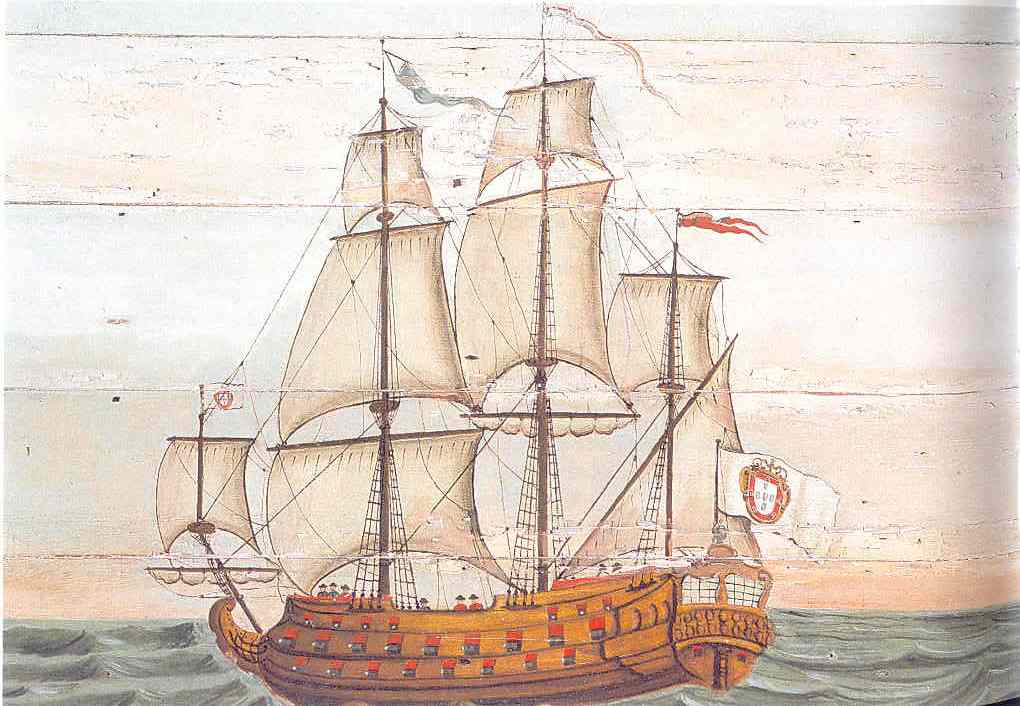|
|
 |
|
Based on a visit during September 2002.

|
| Painting of Portuguese ship, Sintra Palace. |
|
 |
The indispensable guidebook is Portugal, one of Dorling Kindersley's Travel
Guides.
Portugal has coverted historic buildings, such as castles and monasteries, into
hotels, called pousadas. They are fantastic and memorable places to stay, often the most building in a particular location.
We stayed in the former monastery in …vora and in the castle of ”bidos. This is the website describing all pousadas: http://www.pousadas.pt/contents.html. You also will find ways to contact them in any guidebook.
We also had a visit to Lisbon -- far too short! Lisbon
Don't miss the royal palace of Sintra. Sintra
Cod -- "bacalhau" -- is the leading seafood and the national dish; it is
often barbecued with olive oil. You will find many other fish and seafood, as well. There is more chicken than
in Spain. As all over the Iberian Peninsula, you will find ham on every menu. The olives and the olive oil are
superb and vary widely as we traveled around the country. Everywhere you go, order cheese on the menu and you will get
some excellent local cheeses, including sheep's cheese and "mountain" cheese. See Portuguese Wines. Wines were among the chief pleasures. Wd didn't try the suckling
pig, but many do: Suckling Pig - Cascais
We find that small dictionaries are more useful than phrasebooks. In Portugal,
we used the dictionary most often while deciphering menus, but English versions sometimes are available. Learn a few
bsic phrases and you will get a warm response. Assuming you don't speak Portuguese, start off with English or French.
Then, if that doesn't work, try Spanish. The Spanish and the Portuguese can understand each other if they speak their
own languages slowly. There is absolutely no problem visiting Portugal if the only language you know is English.
See Literary and Musical Portugal, where the most important recommendation is to buy Paul Buck's book,
Lisbon: A Cultural and Literary Companion, in the Cities of the Imagination series (Interlink Books; New York
2002). You will see beautiful tiles -- everywhere. Portuguese Tiles - Azulejos
Portugal is a country with small towns, and renting a car is advisable except for
the Lisbon phase of your visit. You will find, as we did, that there are almost no automatic transmission vehicles available
from any major agency. If you arrange one, I would not count on its actually being available when you arrive.
In our case, the two women in the group drove a stick shift, so the two men were confined to the back seat. Also be
warned that the Portuguese are known as the craziest drivers in Europe. There is an unfolding superhighway and bridge
system with modest tolls, and these are very lightly used. They are a great way to get make tracks, but at the expense
of local color. Very important to US drivers: stay in the right lane whenever possible. No matter how fast
you drive, someone coming out of nowhere will be on your tail if you are in the left lane. Just stay out of their way.
Also be aware that there are many narrow and hilly roads, as well as small archways. We often had to retract our side
mirrors to get by other drivers and through streets.
As with every destination, consider safety issues: Safety
|
 |
|
|
 |
|
|
 |
|
|
|
|
|
|
 |

